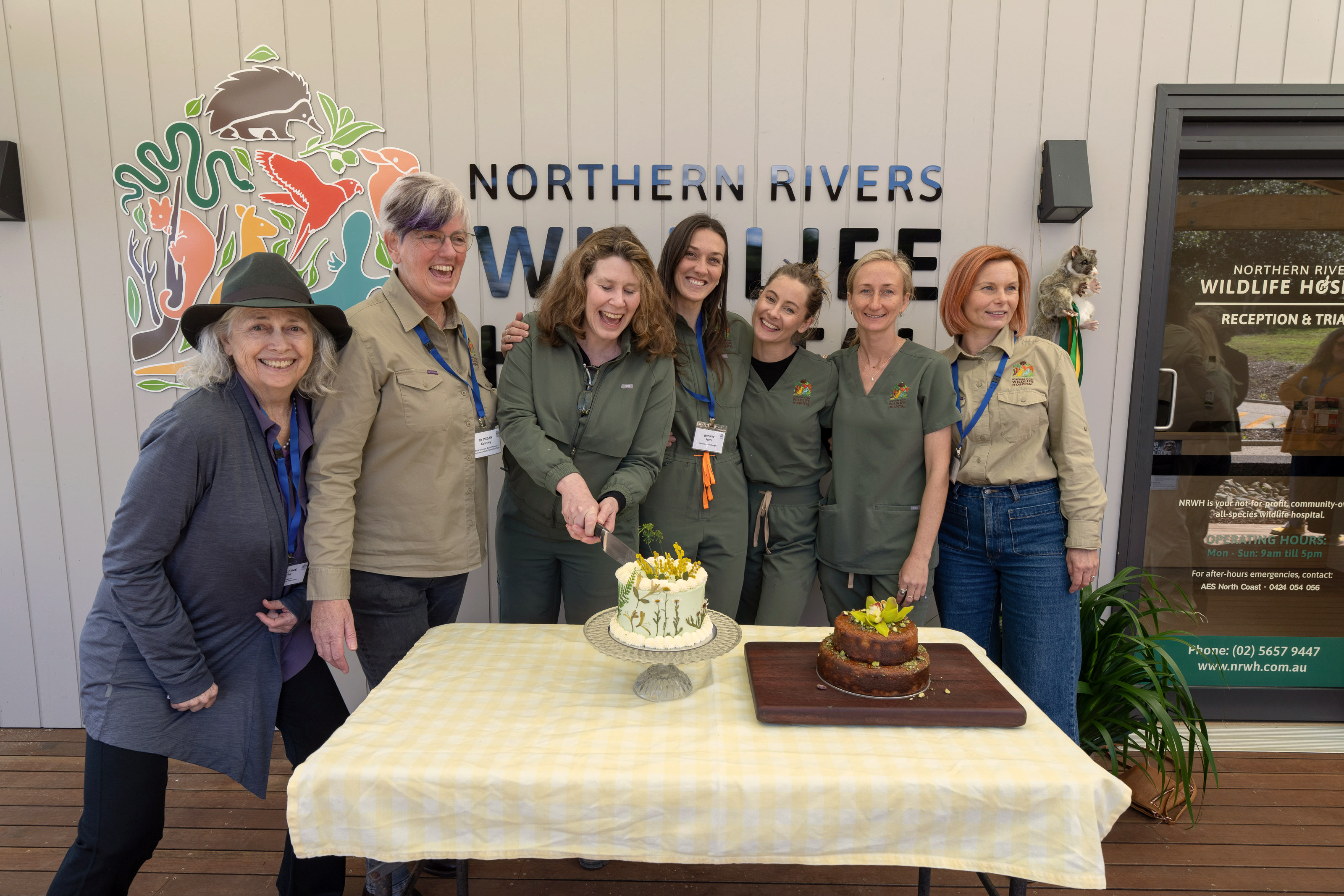Stills here: https://dams.wwf.org.au/resourcespace/?c=6257&k=643127352c
He's the plucky little tawny frogmouth who defied the odds after eating a poison that's decimating Australia's nocturnal predatory birds.
But he would not have pulled through without two weeks of intensive treatment at the new $2.8 million Northern Rivers Wildlife Hospital at Wollongbar, New South Wales, which held an official opening ceremony on 28 July.
Team members celebrate the hospital's official opening on 28 July © Kurt Petersen
The World Wide Fund for Nature Australia contributed $500,000 to help establish this facility as part of its mission to Regenerate Nature by 2030.
"Success stories like the tawny frogmouth are so uplifting for the team and show people we've hit the ground running. We live in a biodiversity hotspot teeming with incredible animals, birds, and reptiles. We're the region's first dedicated 'bricks-and-mortar' wildlife hospital ready to care for sick and injured native species," said Northern Rivers Wildlife Hospital spokesperson, Bronte Potts, General Manager.
The recovery of this sick tawny frogmouth seemed unlikely when he arrived on 30 June with suspected rodenticide poisoning. He was emaciated, weak, unable to perch, in fact barely able to hold himself up, eyes half shut, and feathers fluffed to try to keep warm.
Vets started him on vitamin K, which counteracts the poison. Without even the strength to eat, vet nurses tube fed him a special watered down meat paste fortified with insectivore powder.
Gradually the team introduced solid food. They would brush sensory feathers above the beak triggering the beak to open so they could pop in a small meatball.
Vet nurse Hollie Blair knew they had turned a corner when they no longer had to cajole him into eating.
"As soon as we opened the door he'd open his mouth ready for the food. He looked like a different bird, sleek and bright-eyed. To see such a massive difference is very rewarding," she said.
"Success with injured animals depends on three things: rapid response, minimising trauma during treatment, and maximising potential for early release", said Madeleine Faught, Chair of NRWH.
"Successful treatment of this tawny frogmouth required attention from a number of staff over a longer period of time versus a 'quick fix'. Well worth the time and effort to see this bird recover," she said.
After a fortnight at the hospital, the tawny frogmouth was sent to a carer with a large aviary. There he rebuilt his flight strength and has now been released.
His plight highlights a wildlife crisis occurring across Australia. Second generation rat poisons are killing birds of prey who feed on rodents that have eaten baits.
In a social media post, Northern Rivers Wildlife Hospital advised people to buy rodent traps instead of poison and if using pesticides as a last resort, use wildlife-safe baits only.
In just 12 weeks, the hospital has treated 260 wildlife patients, including 16 coastal carpet pythons, 13 tawny frogmouths, 16 pigeons (mixed species), 9 kookaburras, 33 lorikeets (rainbow and scaly-breasted), 9 short-beaked echidnas, 12 possums (brushtail and ringtail), 19 macropods (mixed species), and 24 bats (mostly flying foxes).
Nicole Forrester, Chief Regenerative Officer for WWF-Australia, said native animals, birds and reptiles all play a role in a healthy ecosystem.
"Rehabilitating sick and injured animals and returning them to the wild can help to Regenerate Nature by 2030. The 2019-20 fires exposed an urgent need to boost the capacity of wildlife care in important native species hotspots. Five years on and WWF funding to multiple facilities, including NRWH, supported their work to help heal nature," Ms Forrester said.
Aside from WWF, Northern Rivers Wildlife Hospital has been supported by a number of foundations, individual donors, monthly giving and grants from the Federal and NSW governments.
"Animals are treated free of charge, but keeping the hospital running is not. All at NRWH are genuinely passionate about what they do, but, like many not for profits, need to focus significant time on fundraising to cover costs. We love wildlife. Let's look after them for their future," said Madeleine Faught, Chair of NRWH.







